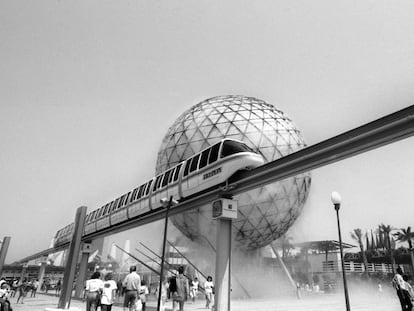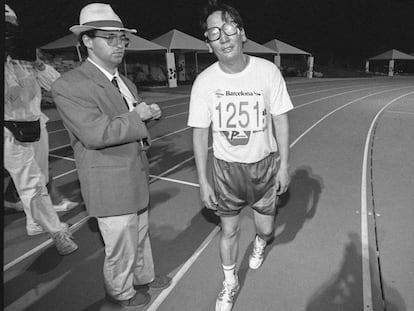The Games that changed Spain: 25 years on from Barcelona ’92
Runaway success of the Olympics launched the nation’s athletes into new dimension of sport
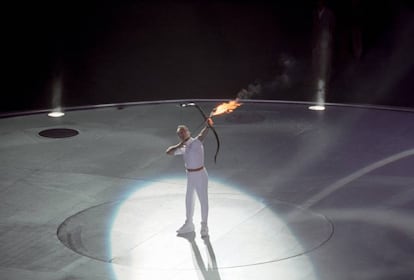

“À la ville de… Barcelona.” (To the city of... Barcelona). Nobody had the slightest inkling that those famous words uttered on October 17, 1986 by Juan Antonio Samaranch, then the International Olympic Committee (IOC) chief, were anticipating Spain’s consolidation as a modern, open country. And not just politically and socially, either. The success of Barcelona ’92, both at the organizational level and in terms of athletic accomplishments, far surpassed anything imagined by even the most optimistic of forecasters. A country that was still insecure about its 40-year dictatorship and international isolation was finally able to shake off its inferiority complex. The Olympic Games pulled Spain out of its “Third-World-status” and brought it closer to its European neighbors.
There were good reasons why Spaniards were afraid that the games would make them look ridiculous. Four years before Samaranch read out the winner, Spain had organized a soccer World Cup notable for its pessimistic media coverage. The national team was as overwhelmed as were the event organizers. And Spain’s Olympic history was a barren field: since 1900, Spanish athletes had earned 26 medals at 16 summer games.
An internal study conducted by organizers of Barcelona ’92 expected that Spain would win 12 medals, three times as many as at Seoul 1988. It seemed like a presumptuous assertion to make – until the Games came around and Spaniards got up on the podium an unthinkable 22 times.
Any day, at any given hour, in the most unexpected Olympic discipline, another Spaniard would secure a new spot on the podium
With a budget of 154 billion pesetas (€925 million) to work with, Barcelona not only faced a major challenge in terms of getting Spanish athletes up to speed; it was also faced with the games of reconciliation: South Africa was back following the end of apartheid, and Germany and Yemen had unified teams again. But mostly, the challenge was one of size: Namibia, Latvia, Estonia and Lithuania went as independent nations, the dismembered Soviet Union flew the white flag with the five rings, and Croatia, Slovenia and Bosnia competed on their own after the breakup of Yugoslavia. There were 169 countries, 10 more than in Seoul ’88, and 9,370 athletes. There were an additional 35,000 volunteers (plus 15,000 more in the Paralympic Games) who had a big impact on the smooth running of the event, and proved its popularity with the locals.
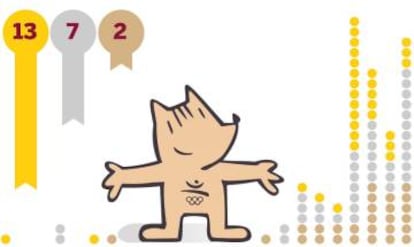
The new Olympic order imposed by Samaranch – himself a native of Barcelona and the second-longest-serving president of the IOC – increased the business focus. Symbolizing this new view was the fact that Barcelona ’92 brought, for the first time, members of the NBA Dream Team to the Olympic Games, with Magic Johnson, Larry Bird and Michael Jordan heading the US basketball team that won gold. The 12 players’ combined salary was more than half as much as was spent on training 900 Spanish athletes for eight years prior to the Barcelona Games.
While the city took the opportunity to refloat many urban planning projects that had been gathering dust, Spanish sport managed, for the first time, a significant financial shot in the arm with the ADO Plan, a 1988 initiative to aid elite athletes. This helped athletes focus exclusively on their training, and their performance improved greatly. Sponsors were putting up the money, but they demanded results. And there were results.
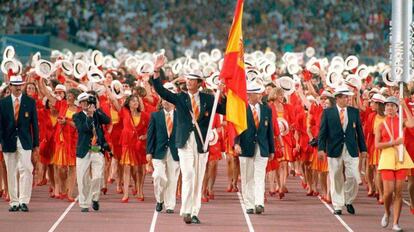
Between July 25 and August 9, there was an accumulation of medals. Any day, at any given hour, in the most unexpected Olympic discipline, another Spaniard would secure a new spot on the podium. In the end, there were 13 golds, seven silvers and two bronzes. Soccer was king, but there were also successes in athletics, gymnastics, field hockey, judo, swimming, tennis, archery, sailing and water polo. Suddenly, those little old Spaniards were capable of competing at the highest level of sport. For 15 days, an entire nation was left rubbing its eyes in disbelief. And sponsors – both public and private – gained new insights into the enormous potential of sports as a vehicle for advertising. Today, 25 years later, a Spain brand exists.
The new order imposed by Samaranch increased the business focus of the Games
Without taking anything away from anybody, there a few dates in 1992 that went down in the history of Spanish sport. One is July 13, when the judo player Miriam Blasco managed a double whammy by becoming the first Spaniard to win a gold at Barcelona, after being the first to have won a bronze in any summer games. Until then, there had been a grand total of 92 women athletes in the Olympic Games. There were 127 in Barcelona, and to date there have been 700. At Rio 2016, women represented 48% of the Spanish delegation and notched up nine out of 17 medals. Four years earlier, in London, they had brought home 11 out of 17.
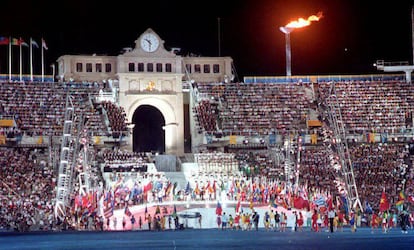
On August 8, a day before the closing of the games, there were two memorable moments. One was when track-and-field runner Fermín Cacho won gold in the 1.500-meter race – including his arch-famous final sprint. Just hours later, with the Camp Nou stadium filled to the rafters, the Spanish national team scored a victory, leading to wild displays of euphoria by the likes of Pep Guardiola – who these days campaigns for Catalan secession from Spain. In fact, in the current political climate it would be unthinkable for an event like Barcelona ’92 to be as depoliticized as it was, with all parties rowing together in the same direction.
The soccer victory was the cherry on the top of a fantastic Olympic event that confirmed the professionalization of Spanish athletes, ensured a steady flow of revenue from sponsors, and turned television rights into the great Olympic cash cow. For Spain, it also meant the definitive take-off of sport, which has been climbing to new heights ever since then.
English version by Susana Urra.
